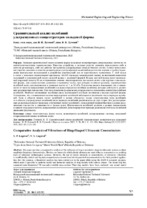Сравнительный анализ колебаний ультразвуковых концентраторов кольцевой формы

Date
2021Publisher
Another Title
Comparative Analysis of Vibrations of Ring-Shaped Ultrasonic Concentrators
Bibliographic entry
Луговой, В. П. Сравнительный анализ колебаний ультразвуковых концентраторов кольцевой формы = Comparative Analysis of Vibrations of Ring-Shaped Ultrasonic Concentrators / В. П. Луговой, В. В. Луговой // Наука и техника. – 2021. – № 2. – С. 121-126.
Abstract
Приведен сравнительный анализ влияния формы кольцевых концентраторов ультразвуковых систем на их амплитудно-частотные характеристики. Известны устройства, в которых упругие элементы используются либо в качестве резонаторов, либо как рабочие инструменты ультразвуковых технологических систем. Однако использование упругих элементов в качестве концентраторов ультразвуковых колебаний недостаточно изучено и требует проведения комплексных исследований и разработки рекомендаций для их практического применения. С этой целью в статье с помощью компьютерной программы ANSYS проведен теоретический анализ, позволивший выполнить модальный и гармонический анализ моделей кольца с различной формой. Кольцо круглой формы имеет номинальный наружный диаметр 50 мм и переменное сечение. Анализировались три модели колец: одно круглое и два овальной формы. Для осуществления сравнения и выявления частот, при которых возникает резонанс, характеристики колебаний колец рассматривались в диапазоне частот от 1 до 26 кГц. Результаты анализа показывают, что в зависимости от частоты вынужденных колебаний в кольцах образуются изгибные колебания, которые действуют в различных координатных плоскостях. При этом изменение формы колец сопровождается изменением амплитуды изгибных колебаний. Наиболее интенсивные колебания вдоль вертикальной оси были достигнуты в кольцах круглой формы. Установлено, что с повышением частоты вынужденных колебаний наблюдается увеличение числа периодов колебаний. Если в области низких частот колебаний в кольце образуется только однопериодная мода колебаний, то в области ультразвуковых колебаний число периодов колебаний увеличивается до двух и трех. Все рассматриваемые модели колец имеют несколько собственных частот колебаний с определенной периодичностью в разных координатных плоскостях в зависимости от формы колец. Интенсивность колебаний различна в разных направлениях и зависит от формы и частоты вынужденных колебаний. Демонстрируются примеры разновидностей моды колебаний для всяких форм колец.
Abstract in another language
The paper provides a comparative analysis of the influence of ring concentrator shape in ultrasonic systems on their amplitude-frequency characteristics. Devices are known in which elastic elements are used either as resonators or as working tools of ultrasonic technological systems. However, the use of elastic elements as concentrators of ultrasonic vibrations is insufficiently studied and requires comprehensive research and development of recommendations for their practical application. For this purpose, a theoretical analysis has been carried out in the paper while using the ANSYS computer program, which made it possible to perform modal and harmonic analysis of ring models with various shapes. The round ring has a nominal outer diameter of 50 mm and a variable cross-section. Three ring models have been analyzed: one round model and two models of oval shape. To conduct a comparative analysis and identify frequencies at which resonance occurs, the vibration characteristics of the rings have been considered in the frequency range from 1 to 26 kHz. Results of the analysis show that, depending on the frequency of forced vibrations, bending vibrations are formed in the rings, which act in different coordinate planes. In this case, a change in the shape of the rings is accompanied by a change in the amplitude of the bending vibrations. The most intense ring vibrations along the vertical axis have been achieved in circular rings. It has been found that with an increase in the frequency of forced oscillations, an increase in the number of oscillation periods is observed. If in the region of low vibration frequencies only a one-period vibration mode is formed in the ring, then in the region of ultrasonic vibrations the number of vibration periods increases to two and three. All the considered ring models have several natural vibration frequencies with a certain periodicity in different coordinate planes depending on the shape of the rings. The intensity of the vibrations is different in different directions and depends on the shape and frequency of the forced vibrations. Examples of vibration mode variations for various ring shapes are demonstrated in the paper.
View/
Collections
- № 2[12]
